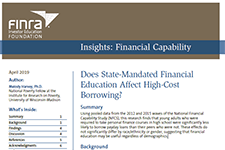Discover financial empowerment resources
Discover financial empowerment resources
Using pooled data from the 2012 and 2015 waves of the National Financial Capability Study (NFCS), this research finds that young adults who were required to take personal finance courses in high school were significantly less likely to borrow payday loans than their peers who were not. These...

This is an infographic summarizing the financial situation of Americans captured in the National Financial Capability Study (NFCS) in 2015. The study shows evidence that the financial circumstances of Americans have improved over the last several years. Americans are finding it easier to pay...
Financial capability is a multi-dimensional concept that encompasses a combination of knowledge, resources, access, and habits. The NFCS is designed to understand and measure a rich, connected set of perceptions, attitudes, experiences, and behaviours across a large, diverse sample in order to...
Employers lose good workers for seemingly inexplicable reasons. Whether it is a long-term, reliable worker who starts missing work or a new hire who seems to be performing well and then suddenly stops showing up to work altogether, employers often do not understand the underlying causes for this...
Using information from the FINRA Investor Education Foundation 2012 National Financial Capability Study, we examined financial capability among people with and without disabilities. Respondents noted as having disabilities throughout this report selected “permanently sick, disabled, or unable to...
In 2009, the FINRA Investor Education Foundation commissioned the National Financial Capability Study—the first of its kind conducted in the United States—to assess and establish a baseline measure of the financial capability of American adults. The 2012 Study—which was developed in...
An individual’s financial literacy and access to basic financial services affects household financial stability and may have long-term effects on financial well-being. With this Study, we have sound empirical evidence regarding which families are most vulnerable and where action is needed most....
